
The word posh, defined rather simply by the Oxford English dictionary as: "upper class," carries huge emotional significance for the British individual. It defies definition, denoting a subtle mix of money, education, and culture.
It is highly subjective, varying to reflect the relative status and values of those using the term. And yet it is also resoundingly easy to define: a group of outwardly similar individuals will readily reach a consensus about who among them is or is not posh.
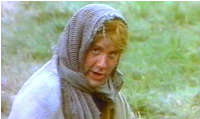

So why does anyone care about poshness? Don't British people have access to cheap education and healthcare, great independent films, and high disposable incomes?
Well, it's hard to say why our obsession with poshness persists. Perhaps the cultural identity that comes from outside toilets, chip butties, the dole, back lanes, no central heating, and cold knobbly knees can't be eroded by a few decades of socialized education.
And all this mobility and outward equality may even have even made us more obsessed with who is and who isn't posh. For successful people, being posh is not necessarily desirable.
After all, there's nothing more fun than swaggering around the cloisters of a posh University polluting the summery air with your coalminer's brogue. Being intellectual and working class (Morrissey, Harold Pinter) is the last word in street credibility, so there's a lot at stake.

So, how is the American visitor to move in this heavily nuanced social environment? Can the signifiers of class be learned or does it take a lifetime of practice?
Well, the most common indicator of class for the native British listener is accent. The flatness or flutedness of vowel sounds, or the glib use of colloquialisms, can say more than a mouthful about your interlocutor's wallpaper and whether they grew up on posh Bird's Eye fish fingers or the cheap 'No Frills' variety.
The real fun is in figuring out the subtle combinations: the jumped-up geordie or the posh bird who's slumming it with a fake liverpudlian twang. This is tricky stuff, and it takes a highly trained ear along with several years of immersion in Monty Python and Coronation Street to get close to figuring it out.
As a foreign visitor then, you may try to discern the basic accent types, distinguishing the plummy BBC announcer from Trainspotting Glaswegian, but we recommend that you focus your efforts not on the wiles and guises of accent but by testing the customs and reflexes that take more than a few elocution lessons to erase.

This brings us to our case in point: Posh Spice. How bleeding posh is Posh Spice?
I want you to imagine that we are in London, and we are meeting Posh Spice for the first time. We have been invited to her Kensington flat on a Wednesday evening. We already know that she is rich, that she lives in a posh neighbourhood, that she can't sing, and that she married the stupidest football player in the league, which means she is probably none too bright herself, but the question that nags at our brains is: How posh is she?
Without the compass of accent to guide us, we are going to figure out how posh our new friend Posh Spice is by using the following three simple techniques:

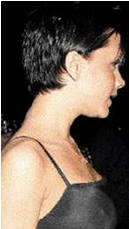
I want to draw your attention to something far more basic than accent, something you can discern before Posh Spice even opens her mouth. Observe, ladies and gentlemen, the set of the jaw.
From ten feet away, each of the Spice Girls appears stunningly beautiful, soft and feminine. As the camera homes in, however, we see in the mouth an unmistakable hardness. This, ladies and gentlemen, is the jaw of the working class.
Where does this jaw-clenching come from? In part it's the worry and the struggle, dodging hangers of spit in the corrugated iron corridors of your crappy inner city school, warming your corned beef legs on a Calor gas fire, and fending off lads with nascent facial hair who want to snog you at the bus stop. The hard life itself entails a lot of face-distorting screaming and yelling (as in, "gerrawaaaaay frerm me hoose, ye beggar ye!").
But, also it's growing up speaking a dialect. Most British dialects place great demands on the face that later refinement of accent cannot erase. The northern ones in particular cannot be uttered correctly without first setting the jaw into a grimace.

As an example, I have a geordie song here that I'd like us all to sing. Geordies are from Newcastle in the north of England. Geordie is the second least intellligible accent in Britain, the first being Glaswegian. Most of our songs are about coal but this one is about a cow.
In geordie:
Carhacky, Carhacky, Carhacky through the watter,
Hacky is a bonny coo but Hacky winna wade the watter.
Hacky is a bonny coo, aall the lassies do adore her,
Hacky is a bonny coo, but Hacky winna wade the watter.
And in a moderate English accent:
Carhacky, Carhacky, Carhacky through the water,
Hacky is a pretty cow but Hacky will not wade the water.
Hacky is a pretty cow, all the ladies do adore her,
Hacky is a pretty cow, but Hacky will not wade the water.


A true departure from one's class roots can produce an undoing of the jaw, but the process takes years and is easily reversed if one is immersed back into the native environment.
Here are a couple of photos I took randomly in Whitby. See how relatively attractive girls are made hideous and whorish by this affliction of the jaw.
Posh Spice verdict:
With regard to our subject of investigation, it is true that,
of all the Spice Girls, Posh Spice has the least hardened jaw.
In part this is because she is from the south of england where
the accents are less face-distorting. Also, her dad was a jumped-up
electrician and sent her to a posh school. But, especially when
we scrutinize her early school photo, the evidence is clear: Posh
Spice has the jaw of an auld fishwife and is as hard as nails!
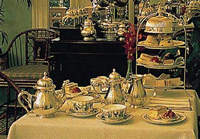
For our second technique, we have the most English of Englishnesses: the nice cup of tea. Everybody knows that the English drink tea, but the image that has been promoted is one of genteel nineteenth century English people sitting down to tea and crumpets, or scones, or cucumber sandwiches, at around four o'clock in the afternoon.
Looking out for that sort of tea-drinking will get you nowhere. Among twenty- to forty-somethings, it hardly exists. People of all classes have eschewed the dainty teacup for the coffee mug, and loose tea for the Tetley teabag. Tea is drunk as a punctuation mark at all times of day, so it's harder to pin down class differences there.
What I propose we cling to then, is the urgency with which tea is drunk, the distinction between tea as a recreational drink among many other possible drink choices, and tea as a need, a totemic welcoming device, a comfort in times of strife.

Tea, since the eighteenth century, has been the lifeblood of the working class. A recent study of the industrial revolution in Britain revealed that the medicinal properties of tea permitted the population density that was needed to support the industrial revolution.
Previously, such densities of people had been quickly wiped out by epidemics, but, as well as partially sterilizing the water through boiling, tea itself had medicinal effects that protected against cholera. Only in Japan, another heavy tea-drinking nation, were similar densities possible.
Beyond its medicinal effects, tea was a great source of comfort, adding warmth and cheer to a diet of bread, lard, and cabbage. George Orwell in his 1933 study Down and Out in Paris and London details how the homeless were sustained by tea and how 'tea and two slices' was one of the last luxuries that a penniless man would forfeit.
In hard times then, tea became a source of strength and bonding, warding off hunger and worry. A visitor might not be fed but you would make bloody sure that you could offer him a cup of tea. The serving of the tea in a working class household marks the time for telling stories and gossip. If someone has undergone a trauma, the first thing you do is put the kettle on.
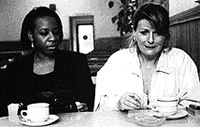
Tea carries such social significance that not being offered a cup of tea in a working class home is the same as being told, 'you are not welcome here.' Even for working class people who have vastly improved their social and intellectual circumstances the tea reflex is powerful and unchangeable. I offer to you that you can measure the class of your host accurately by the rapidity and sense of urgency with which he offers you a cup of tea. (And it has to be tea, the brown caffeinated kind, with milk, the sort you can stand your spoon up in.)
I should also mention that there are a couple of important linguistic signs that can be used while making your tea observations:
A working class person is likely to say not that they'd like a cup of tea but that they need a cup of tea. While drinking the cup of tea they will constantly comment on how lovely it is.
Also, a working class person will always say 'let's have a cup of tea,' a 'cuppa,' or 'some tea' rather than simply 'let's have tea.' Tea used by itself for the working class denotes an evening meal, eaten at about 5 or 6 pm, as opposed to the middle class 'dinner.'
Posh Spice Verdict:
Getting back to our subject of Posh Spice, I can personally
guarantee that when Posh goes home to visit her mam and dad, the
very first thing they do when she walks in the door is to ask
her if she needs a lovely cup of tea. Common as muck!
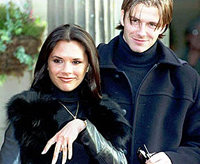
David Beckham: "That's a nice fur coat you're wearing, petal."
Posh Spice: "Thanks, it was reduced to ten quid in the market!"
Finally, I would like to demonstrate a third technique, which I have called the commodity/price reflex.
Admire the coat or dress of a working class person and they will instinctively, compulsively tell you how much it cost. As a secondary impulse, they will tell you what brand it is.
A middle or upper class person will thank you for the compliment or make some comment about the colour or season, anything but the price. Or, at least, they won't tell you the price of everything you ask about.
This reflex comes from a curious combination of working class social values that is hard to explain. On the one hand, you might be assuring the giver of the compliment that the thing you are wearing wasn't really that expensive and that you aren't trying to act posh by wearing it in spite of the fact that it's so nice. A sort of inverted snobbery. In the same way, you might be showing your excessive thrift, your ability to find bargains and make money go a long way--a strictly working class value.
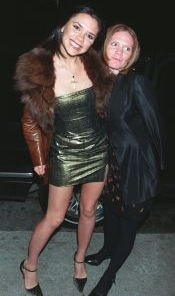
There is a variant of the commodity/price reflex that involves a conflicting working class impulse, this time exaggerating how expensive something is and emphasizing its label, while wishing to remain explicitly working class.
When I was about 16 I was briefly in a gang called the 'Fox Casuals' who used to hang around in the bus stop outside the Fox and Hounds Pub, shouting abuse at students. Casuals were defined by their de rigeur uniform of Burberry scarves and Pringle golf shirts, two of the most singularly stodgy and uncool clothing labels in the western hemisphere. Burberry, in particular, manufactures country clothing for the upper class.
The important thing to grasp here is that in wearing these clothes there was not a hint of trying to emulate the behaviour or value system of the more privileged classes, of trying to be posh. Indeed some members were rather circumspect about letting me into the gang as I was widely known as being a bit of a swot, and of not having a strong enough geordie accent to be truly hard as nails. In fact, the wearing of this labelled clothing was more fundamentally linked to the cash value of the items, and often to their status as shoplifting trophies.
So, it's complex, but the point is that if you admire a working class person's trousers, you should know what answer to expect. You should come away knowing exactly how much it was and, probably, who manufactured it.
Posh Spice verdict:
Returning to our subject of study, Posh Spice, whose main
qualifying characteristic of poshness is that she is always wearing
"a little Gucci dress, a little Gucci dress, or a little Gucci
dress." Posh Spice is unmistakably in the same category as the
members of the Fox Casuals. Primarily she want us to know what
labels she is wearing and how much they cost. She's as common
as muck!
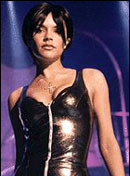
So, to review our verdicts from each technique:
1. The Jaw
Posh Spice's jumped-up background has softened her jaw to some
extent. She did have access to Marks and Spencer's rice pudding
thanks to the pile her dad made doing some kind of vulgar construction
work. But the hard set of her face has scabby-kneed scally written
all over it.
2. The cup of tea
Well, we don't exactly have actual proof of this one, but we just
know it! When Posh Spice gets home at the end of the day she is
gagging for a cup of tea and, as she slurps it down, she can't
help commenting on how lovely it is. Hard as nails.
3. The Commodity/Price reflex
Admire Posh Spice's outfit and all you'll hear back is the label
and how much it cost. A dead giveaway -- she's rough as a badger's
arse and has probably shoplifted a thing or two in her time.
***
A foreign visitor can never be truly at home in a country until he shares the neuroses of its people. How Posh is Posh Spice? She's common as muck!